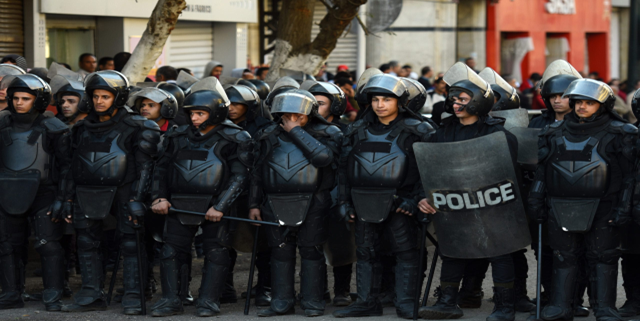
Amnesty International has accused Egypt of attempting to cover up a decade of “unrelenting violations of human rights” in order to improve its international standing ahead of hosting the world climate summit.
Amnesty International’s analysis of the human rights situation in Egypt reveals that the National Human Rights Strategy paints a deeply misleading picture of the human rights situation in Egypt
Egypt’s human rights record has come under intensified scrutiny ahead of the November global COP27 summit in the Red Sea resort of Sharm el-Sheikh. Dozens of international rights groups have called on Egypt to end its crackdown on civil society and protect freedom of expression.
Egypt’s human rights crisis has only deepened during the year since the regime launched a National Strategy for Human Rights, with violations continuing unabated in the lead-up to COP27, according to a new report by Amnesty International.
Amnesty’s new report shows that one year on, Egypt’s National Strategy for Human Rights remains little more than “a Public Relations stunt”, with the recent re-arrest of activist Sharif Al-Rouby only the latest evidence.
“Egyptian authorities have created the National Human Rights Strategy as a shiny cover-up to their unrelenting violations of human rights, thinking they would fool the world ahead of COP27,” said Amnesty Secretary General Agnès Callamard.
“But the grim reality of their notorious human rights record cannot be rebranded in a Public Relations stunt.”
The Amnesty report notes that the strategy, which was drafted without any input from independent human rights organizations or the public, blames Egyptian citizens instead of the government for the human rights crisis.
The strategy also extols the constitutional and legal framework in the country, notwithstanding the many repressive laws on the books that ensure a permanent state of emergency and authorities’ willingness to flaunt constitutional protections at will.
Callamard called on the international community “not to be deceived by Egypt’s attempts to conceal the magnitude of the human rights crisis in the country.” Instead, it must “put pressure on the Egyptian authorities in public and in private, to take meaningful steps to end the cycle of abuse and impunity, starting by releasing the thousands of critics and opponents arbitrarily detained in Egyptian jails, easing their grip on civil society, and allowing peaceful protests.”
The recent arrest of activist Sharif al-Rouby, just three months after his latest release from long-term pretrial detention, offers yet more evidence for Amnesty’s argument, with seven human rights organizations saying yesterday that it “belies allegations by some about a human rights breakthrough in Egypt.”
Al-Rouby’s lawyer stated that prosecutors’ questioning revolved around his client’s comments regarding the difficulties facing those released from long-term detention.
In an interview with Al Jazeera earlier this month, for instance, Al-Rouby addressed the financial hardship, travel bans, and security measures political prisoners experience after release.
Instead of addressing those problems, authorities decided to haul al-Rouby back behind bars.
The human rights organizations noted that al-Rouby’s arrest “is an explicit threat to all those recently released, pointing to a possible threat of repeated arrest.”
It also “completely contradicts the announced efforts of the Presidential [Pardon] Committee in its endeavor to release political detainees,” they added.
Al-Rouby’s comments and rearrest have helped to generate momentum around resolving the problem, with initiatives announced by the Civil Democratic Movement, the Presidential Pardon Committee, and lawyer Khaled Ali.
Lawyer and national dialogue board of trustees member Negad El-Borai called for the national dialogue to adopt the suggestions made by Reform and Development Party head Mohamed Anwar El Sadat, though he noted several steps that authorities can take immediately to remedy some of the worst injustices.
These include removing arbitrary travel bans on released political prisoners—not to mention freeing al-Rouby immediately.
Amnesty International’s new report is based on extensive documentation of patterns of human rights violations committed in Egypt since Abdel Fattah al-Sisi came to power, as well as information gathered since the launch of the National Human Rights Strategy (NHRS) from multiple sources, including victims, witnesses, human rights defenders and lawyers.
The organization also reviewed official documents, audio-visual evidence, and reports by UN bodies among others. Findings and recommendations were shared with the Egyptian authorities on 7 September 2022.
Since the launch of the NHRS, the Egyptian authorities have repeatedly referred to it in public and in private meetings with other governments as evidence of their commitment to human rights.
The five-year strategy was drafted by the government without any consultation with independent human rights organizations or public engagement and presented a deeply misleading picture of the human rights crisis in Egypt.
It absolves the authorities of any responsibility by blaming security threats, economic challenges and Egyptian citizens themselves for “failing to understand” and exercise their rights.
The strategy lauds the constitutional and legal framework, while ignoring the authorities’ introduction and application of a series of repressive laws that effectively criminalize or severely restrict the exercise of the rights to freedom of expression, association and peaceful assembly.
These laws further eroded guarantees of fair trial, and entrenched impunity for security and military forces.
The strategy also ignores the authorities’ dismal record since July 2013 of cracking down on dissent, with thousands still arbitrarily detained or unjustly prosecuted.
In the past two years alone, dozens have died in prison following deliberate denial of healthcare and detention in cruel and inhuman conditions.
Egypt is set to host the UN Climate Change Conference, COP27 in Sharm El-Sheikh in November.
Environmental and human rights groups have raised concerns about limiting protests to “designated areas” and the ability of the Egyptian civil society to meaningfully participate without fear of reprisals.



